Iran on Saturday imposed sanctions on dozens more Americans, many of them from the US military, over the 2020 killing of General Qassem Soleimani in a drone strike.
The move came as talks continued in Vienna Saturday between Tehran and five world powers — Russia, China, France, Germany and Great Britain — on the lifting of crippling US sanctions imposed by the former Trump Administration.
The meeting of the working group to remove sanctions is part of the overall eighth round of Vienna talks to revive the 2015 Iran deal that included Tehran the five world powers and the United States, which left the deal in 2018 and now seeks to return to it.
Vienna talks involving the US, have been held indirectly, with Washington focused on bringing Tehran back into nuclear compliance with the deal, known as the Joint Comprehensive Plan of Action.
In a move that spoke to continued Washington-Tehran tensions, Iran's Foreign Ministry said 51 Americans had been targeted for what it called "terrorism" and human rights violations. The step lets Iranian authorities seize any assets they hold in Iran, but the apparent absence of such assets means it will likely be symbolic.

The ministry said in a statement carried by local media that the 51 had been targeted for "their role in the terrorist crime by the United States against the martyred General Qassem Soleimani and his companions and the promotion of terrorism and violations of fundamental human rights".
Soleimani, the commander of Iran's Quds Force, the overseas arm of the elite Revolutionary Guards, was killed in Iraq in a drone strike on Jan. 3, 2020, ordered by then-President Donald Trump.
Those added to Iran's sanctions list included US General Mark Milley, chairman of the Joint Chiefs of Staff and former White House national security adviser Robert O'Brien.
In a similar move announced a year ago, Iran imposed sanctions on Trump and several senior US officials over what it called "terrorist and anti-human rights" acts.
Iranian President Ebrahim Raisi, speaking on the second anniversary of Soleimani's assassination, said this week Trump must face trial for the killing or Tehran would take revenge.
Iran charged that Israel's role in the Soleimani killing showed that it was a force of global instability.
"The Zionist regime’s admission that it was involved in the assassination of General #Soleimani showed that hostility to this champion of fighting against terrorism in the region, was the link connecting all forces of evil in the world."
Israel opposed the original Iran deal as well as attempts to revive, out of concern that a bad deal only empowers Iran.
On Friday French Foreign Minister Jean-Yves Le Drian told BFM TV and RMC Radio that progress has been made regarding the Iran nuclear talks although time is running out,
Western diplomats have indicated they are hoping to have a breakthrough by the end of January or early February, but sharp differences remain with the toughest issues still unresolved. Iran has rejected any deadline imposed by Western powers.
"I remain convinced we can reach a deal. Bits of progress have been made in the last few days,"Le Drian said. "We have been heading in a positive direction in the last few days, but time is of the essence, because if we don't get an accord quickly there will be nothing to negotiate."
The eighth round of talks, the first under Iran's new hardline President Ebrahim Raisi, opened on December 27 and have included some new Iranian demands to a working text.
Another positive sign this week was the arrival in Vienna of South Korea's Vice Foreign Minister to discuss with Iran, the United States and other parties the possible release of $7 billion of frozen Iranian assets held in the Asian country because of US sanctions.
Any release would need to be approved by Washington.
The ministry said in a statement that the vice minister had agreed with the Iranians that the release of the frozen assets "should take place in an urgent manner."
"It will be discussed at the sanctions removal working groups in Vienna," an Iranian official said, clarifying that the funds would not be released immediately.
Western powers have said progress was too slow and negotiators had "weeks not months" left before the 2015 deal becomes meaningless.
In an interview with Al Jazeera on Thursday, Iran's Foreign Minister Hossein Amir-Abdollahian also suggested the situation was positive, but repeated Tehran's position that all sanctions must be lifted and that Washington should provide guarantees that it will not pull out again.
Little remains of that deal, which lifted sanctions against Tehran in exchange for restrictions on its atomic activities. Then-president Donald Trump pulled Washington out of it in 2018, re-imposing US sanctions, and Iran later breached many of the deal's nuclear restrictions and kept pushing well beyond them.
